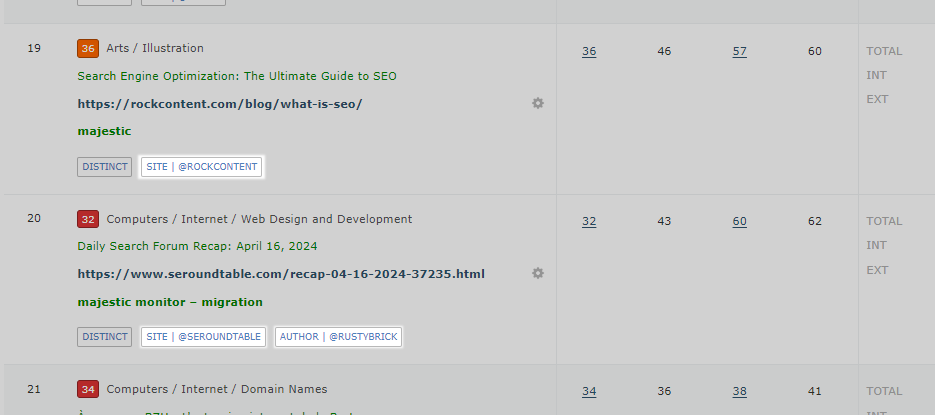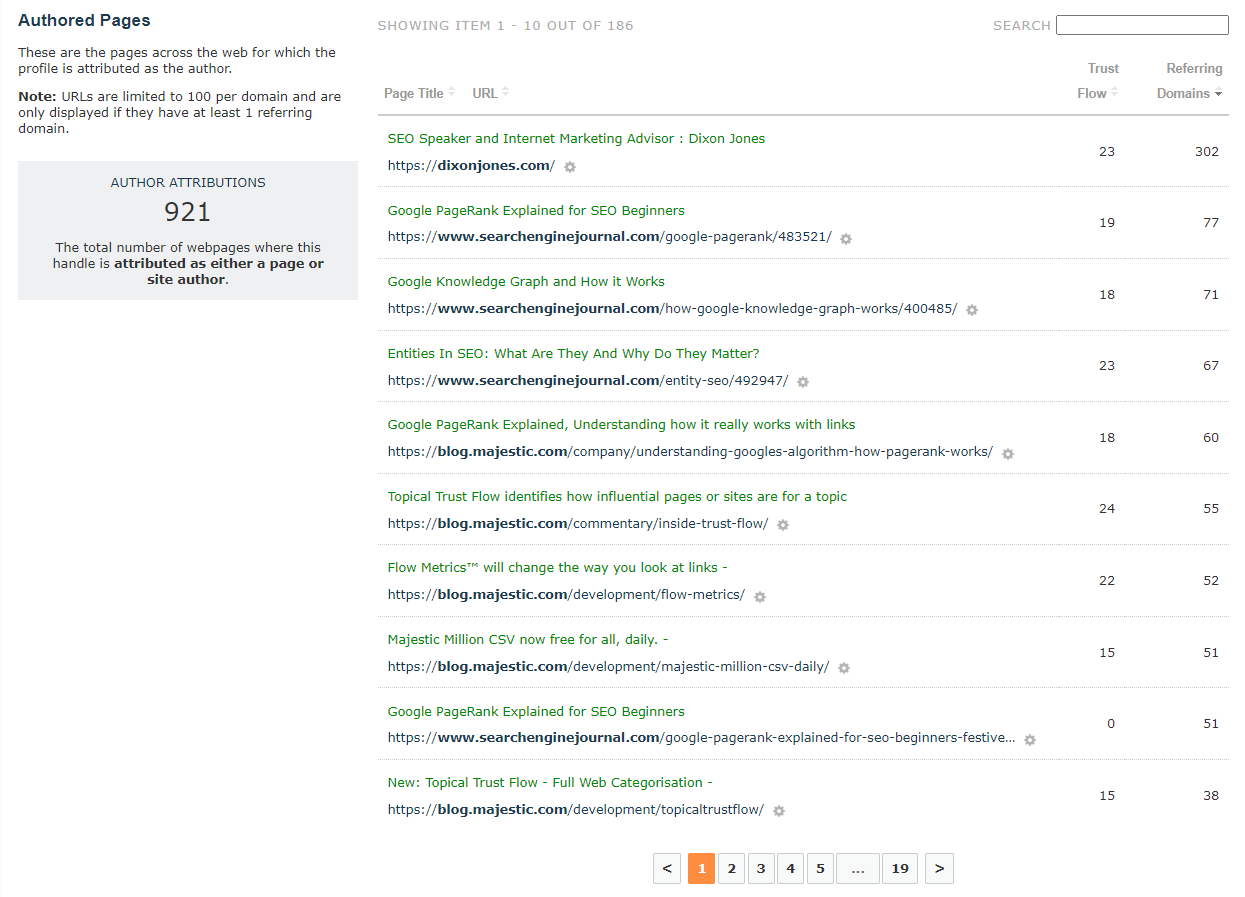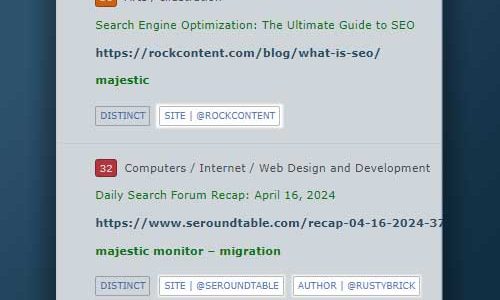
Are you looking for new ways to discover and evaluate influencers in your client’s niche?
Majestic Author Explorer could be for you. Included in the Majestic PRO subscription, Author Explorer integrates with Site Explorer, reporting on content creators and where their output is referenced. This gives you the ability to use the power of backlinks to find creators of interesting content.
Author Explorer also highlights influencers in similar fields, helping you turn an insight of one or two influencers in a niche into shortlists of many, many more.
In this post, we will explore:
- How to find influencers and brands who reference your site, or your competitors
- The hidden html attribution codes that power Author Explorer
- How to use Author Explorer to discover more content by the same author
- Expand your base by finding other content creators who may be relevant to your market
- Find out if the social media output of influencers and brands has been widely reported

You can access Author Explorer from the left navigation, or by using the links provided in the Backlinks and Link Context tabs in Site Explorer.
How to find authors that link to your website (or your competitor’s site)
Site Explorer now includes the attributed site/author information for referring pages in the Backlinks and Context reports.
The attribution tags in Site Explorer link straight through to Author Explorer (try clicking one!), adding a new dimension to prospecting and discovery of link building opportunities.
If you’ve yet to try Link Context, this report adds a visual dimension to the standard backlinks report, attempting to capture where this link is in the page, and the volume of links that surround it. With a little experience, you’ll soon be able to differentiate between high volume directory links and potential quality editorial backlinks. The addition of creator attribution information gives you a signal as to who is writing about your site of interest.
How is authorship attibuted online?
There are a few different mechanisms for identifying “who wrote what” online. An obvious one is links, in that articles and blog posts often link to the social profile, or personal site of an author. However, trying to find which link on a page is an author link is a challenge to automate at scale.
Because machines like structured data, it should come as little surprise that there are ways of annotating web content with machine readable content. This is often invisible to the user, but can be easily parsed by search engines and other web crawlers.
The Majestic web crawler, MJ12Bot is able to understand some of this metadata. This means that when a page is crawled, Majestic can use authorship metadata to find out who is credited with writing what. Author Explorer uses two popular meta-tags as its primary signal.

The fields that Author Explorer uses are “twitter:creator” and “twitter:site”. As you can see from the illustration above, these metatags contain the social media handle of the creator of the article, and the party responsible for the site on which the article sits. There are some nuances about how these tags are handled by Author Explorer which are described in the meta-tag attribution model section below.
You may be wondering if the rebrand of Twitter to “X” impacts this. At the moment, the answer seems to be, “no.” Part of the reason may be that these tags are built into web pages across the web, and changing them would be a huge exercise. It’s also worth noting, that at the time of writting, the X developer documention refers to twitter metatags, and uses the term “Twitter Cards”.
What’s the relationship between social media and backlinks?
With the rise of smart phones as a preferred device for the consumption of social media, and ease of which apps act as portals for social media, it’s easy to forget that many social media platforms started out as websites.
While some social media sites present themselves as a walled-garden, others take a different approach. Reddit is famous as a community where you can browse content without logging in. That means that people can link to Reddit posts they find interesting, and other people can use those links to gain access to the content. Tiktok and Twitter/X also allow direct linking to individual content.
Open content invites people to share. There are different ways of achieving this, but one way is as a simple link to the webpage hosting the content of interest. These links can be shared in a number of ways, from transient chats to a more permanent record, such as blogs or articles.
Twitter (now X) became a popular platform to share content from. A Twitter handle became part of an influencer’s personal brand, and a popular means for brands to engage with thier audience. It became common for blogs and other publications to reference the author’s Twitter profile via links.
From a link perspective, a social media platform that lets people view content online is just another website. This means that backlink tools like Majestic can analyse inbound links to social media sites and create tools to help you explore this rich data.
How to find content associated with an author/creator
Web pages often contain hidden authorship information associated with a social media profile. Author Explorer helps you access a database of this information. This gives you a new way to discover content by a particular authors/creator (assuming authorship is appropriately credited).
Author Explorer provides five example articles in the summary report. For example, a search for Dixon Jones’ handle provides links from Majestic, Dixon’s own site, his new venture, inLinks, and the industry publication Search Engine Journal.
If you want to see more links, you can drill into “Explore Attributions” using the button, or access the same functionality using the “Attributions” link in the Explorer menu.
In addition to showing pages and websites (domains) where the handle is attributed, the Attributions report also highlights:
- Other handles/creators linked to from similar content
- Some topics the creator has contributed to
- Some handles the creator has referenced in their own content
How to find Similar/Related Authors
Just as social tools are able to lever the social graph to create lists of similar profiles, Majestic is able to lever the web graph to achieve a similar aim.
These matches are based on the principle of finding handles that are linked to on a number of occasions across different websites. So if a number of sites link to both @dixon_jones and @bhartzer, we can infer some manner of relation between the handles.
It’s important to note that this relation does not suggest agreement or even a similar outlook. While we understand Bill and Dixon get on well, it’s totally plausible that other thought leaders in similar field may have completely different outlooks on life. To put it a different way, the similarity tends to reflect an industry or area of expertise rather than outlook or friendship!
With that explanation out of the way, Author Explorer has two different collections of related handles, both based on links coming from similar locations.


The difference between the two links is subtle, but important. The second list of Authors filters out handles which we haven’t found in the creator or site attribution tags. This can be helpful if you are looking for creators with established patterns of contribution to write about your product.
If you copy the data listed, you can expand your list of candidates by clicking through the attribution into the appropriate Author Explorer list and finding similar lists. By starting with a relevant website or content creator, you can quickly create a long list of potential influencers of interest.
Find who has written about an influencer, or what an influencer has said
As well as reporting on content attribution in a number of ways, Author Explorer also reports on direct backlinks found to social media handles and associated social media content.
There tend to be subtle differences of intent between linking to a handle and linking to an individual post.
As an example of linking to a handle, the SEO in 2024 micro-site offers links to contributors’ social media handles. This form of link based attribution tends to be common when crediting speakers, contributors or referencing work or brands.
Author Explorer reports on links to profiles in the “Profile Backlinks” report, shown below.
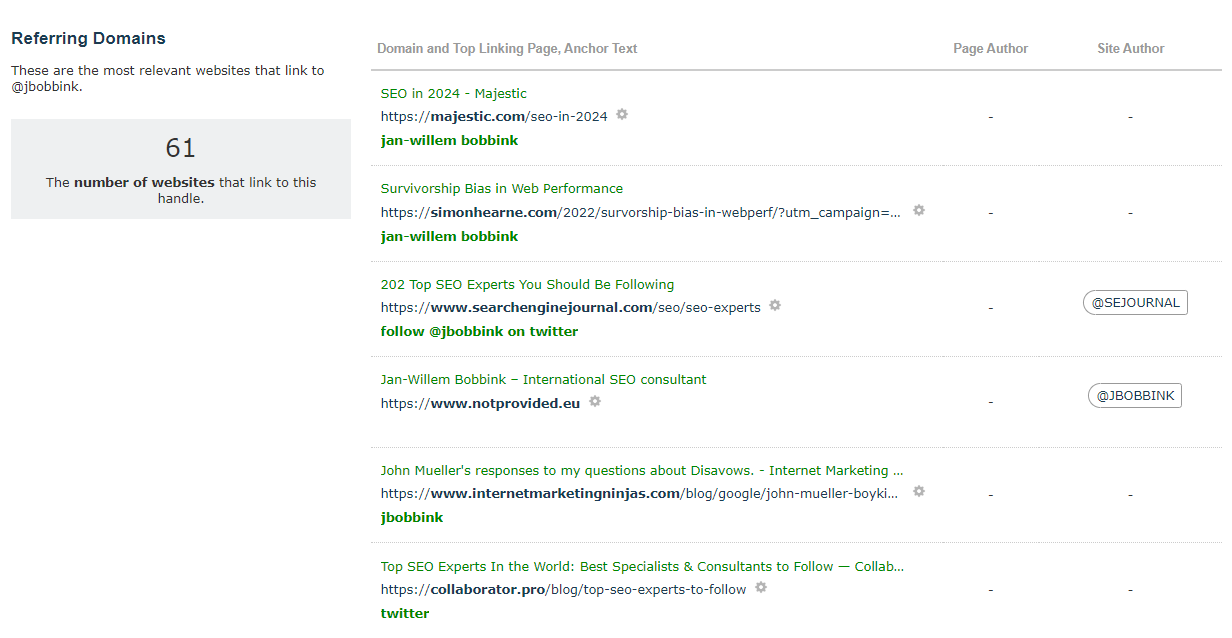
If you are new to a particular niche, finding where the handles of influencers and brands have been mentioned can provide insight. At the top of the report you’ll see a section listing other handles that are linked to from the same sites. These links are clickable, and link to Author Explorer reports for the appropriate handle.
It’s worth noting that this report focuses on web links to social media posts. These can sometimes be quite subtle references, and on occasion can refer to a quote from a third party that links to a particular handle. Fortunately, the pages in question can be accessed by hovering on the relevant cog and clicking “Go to URL”, providing access to the page in question.
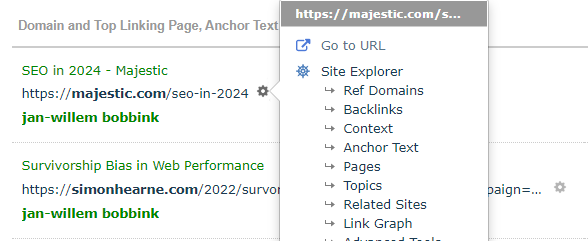
The other type of link discussed above is a link to a social media post. Linking to individual posts tends to occur when someone has said something noteworthy. Sometimes this can be controversial, sometimes just an event of note.
By way of example, at the time of writing, Author Explorer suggests Twitter founder Jack Dorsey has earned links from over 2700 domains with his announcement “just setting up my twttr” on March 21, 2006.
Another noteworthy post by this measure was in November 2021 when Jack released news of his resignation from the company. Author Explorer reports backlinks to this message from just over 1500 domains.
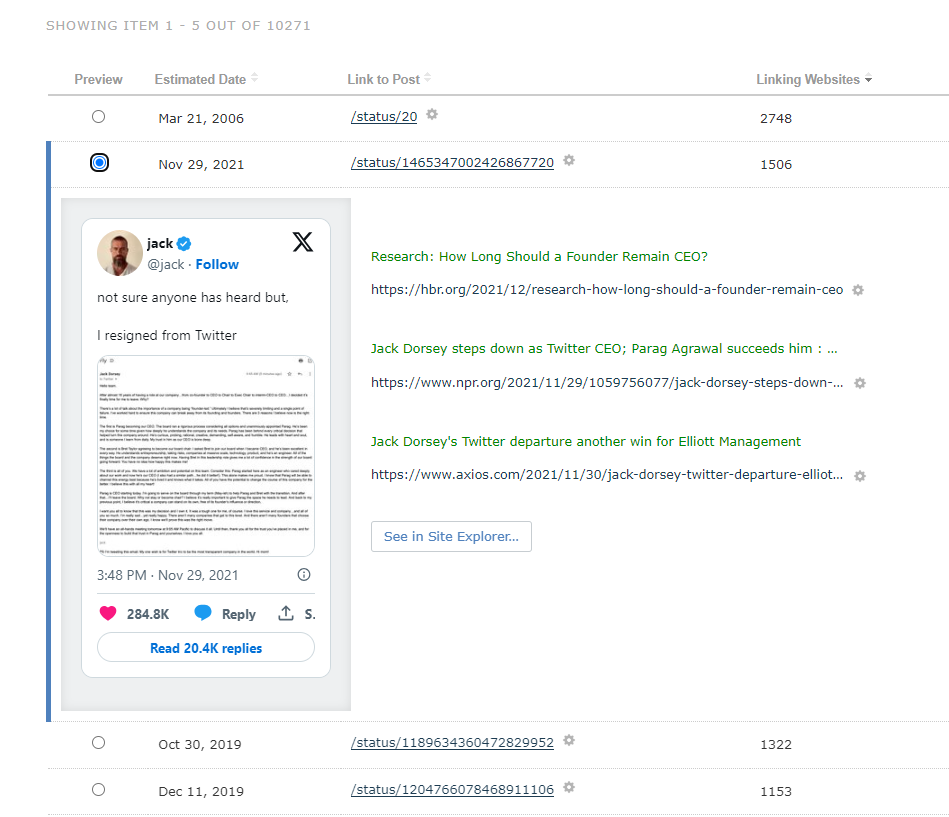
Other uses for Author Explorer
As well as researching content creators, and discovering new opportunities for collaboration, there are additional uses of Author Explorer.
Found an article that has a typo in your social media handle?
Could other articles suffer from the same error? Check out common misspellings of your handle to ensure you are appropriately credited for work you’ve done.
Audit the work that’s attributed to you
Is your handle attributed in work that you had nothing to do with? Author Explorer provides an easy way to find work where your handle is attributed as the author.
Important note on the Meta-Tag attribution model.
Author Explorer uses the Site and Creator meta-tags extensively. Instead of simply reporting on raw data, the data is interpreted in order to enhance consistency and reduce noise. The way the system handles these tags may feel a little odd at first, but there is good reason for it.
In part this is also because the meta-tag attribution data is un-validated. People are free to put whatever they choose in these meta-tags. For example – a search for the @elonmusk handle may find some sites where the tags suggest authorship is questionable.
For many blogs, the site owner and creator will correspond to the same handle. The decision on whether just to use the “Site” meta tag or both “Site” and “Creator” to express this appears somewhat arbitrary and potentially CMS dependent.
Given the ability for different uses of these two fields to mean the same thing, Author Explorer tries to produce more meaningful data by dropping the “Creator” metadata when both the Creator and Site tags are populated and the same.
By treating the Creator tag as optional when an identical Site tag has been specified, a comparable intent is delivered. This technique has the added benefit of making it possible to add the reported Site and Creator counts to give an attribution total.
Similarly, you should keep in mind that incorrect accreditations do exist. For example, there is a well-known UK newspaper who used to attach the username of the subject of an article in their social cards, rather than the journalist… just in case you were wondering if King Charles really did write that local newspaper article!
How to access Author Explorer
Author Explorer is now live. If you are curious, a number of reports are available for free.
Great news for Majestic PRO subscribers – you can use Author Explorer today as a part of your existing subscription. There is no need to activate or “add on” Author Explorer, just find the link in the left navigation menu.
If you have a plan, our customer success team would be happy to provide a one on one live demo to you or your team on Author Explorer – to schedule a Majestic Demo, please register here.
As ever, we look forward to your suggestions and observations – comments are open on this blog post, and we are also happy to recieve your feedback via our customer success team.
- PR link building vs ‘conventional’ link building - April 23, 2024
- Find Bloggers and Creators with Influence and Authority with Author Explorer - April 22, 2024
- Majestic at brightonSEO, April 2024 - April 17, 2024







